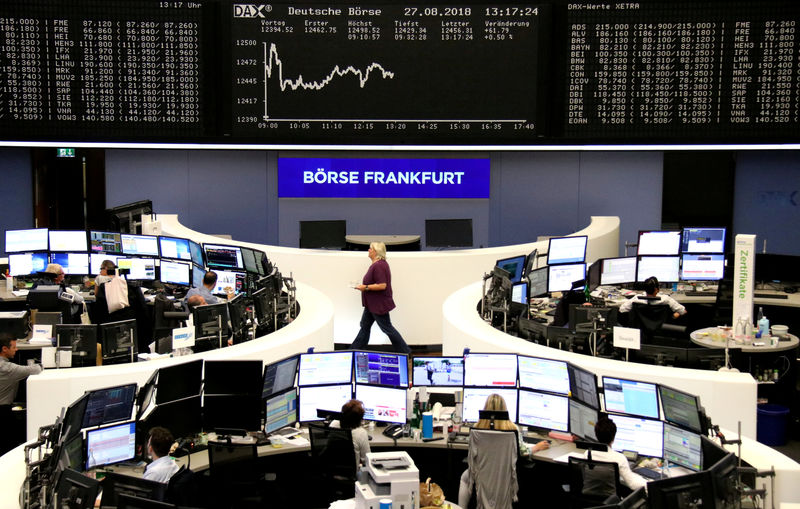By Claire Milhench
LONDON (Reuters) - European fund managers increased their global equity exposure to seven-month highs in August but slashed holdings of emerging-market debt after a turbulent month of selling for the Turkish lira, Argentine peso and other emerging-market currencies.
The Reuters monthly asset allocation poll of 19 European asset managers was conducted Aug. 16-30, when world stocks (MIWD00000PUS) rose to their highest in nearly six months and U.S. equities (SPX) reached record highs. But emerging-market equities (MSCIEF) look set to end the month down 3 percent.
Jan Bopp, investment strategist at Bank J Safra Sarasin, said that since April, U.S. equities had outperformed non-U.S. equities as the U.S.-Chinese trade war set off safe-haven flows, penalizing emerging equities.
"Tightening global liquidity will continue to challenge emerging market assets and in this environment more sentiment shocks are likely to periodically trigger sell-offs," he said.
Investors increased their overall equity holdings by 1.1 percentage point to 44.9 percent and cut cash levels to 7.4 percent from July's 9 percent. The bond allocation fell 1.1 percentage point to 38.1 percent, the lowest since January 2016.
Cedric Baron, head of multi asset at Generali (MI:GASI) Investments, said he was keeping a slight overweight in equities because earnings momentum remained strong and record share buy-backs were providing strong support, especially in the United States.
Although the emerging-market equities allocation was effectively unchanged at 14.8 percent, investors slashed emerging-market debt holdings to 12.8 percent from 18.9 percent in July.
Emerging-market currencies sold off in August, with Turkey's lira
"The situation in emerging markets is challenging with weak fundamentals for some countries, high political uncertainty for others and lower liquidity with the (U.S. Federal Reserve) normalization," said Guilhem Savry, head of macro and dynamic allocation at Unigestion.
The lira is now down some 41 percent against the dollar year-to-date, plumbing another record low in August. But some 69 percent of poll participants who answered a question on Turkey's currency said it had not yet reached a trough.
"The Turkish economy still faces tough times ahead," said Francois Savary, chief investment officer at Prime Partners, adding that the measures already announced by the authorities had not yet addressed the real issues.
"Some capital controls may have to be introduced, a recession is looming, and it could be quite harsh in order to correct imbalances," he said.
Given the scale of the shake-out in emerging markets in August, however, 71 percent of poll participants who answered a question on the subject said now was the time to buy.
Nadege Dufosse, head of asset allocation at Candriam, said emerging-market assets had already built in a risk premium for tighter U.S. monetary policy, a stronger dollar and trade war risks.
But Peter van der Welle, a strategist at Robeco, argued that the resurgent dollar, the unresolved China-U.S. trade disputes and volatile commodity prices were obstacles that prevented the unlocking of the value being created.
